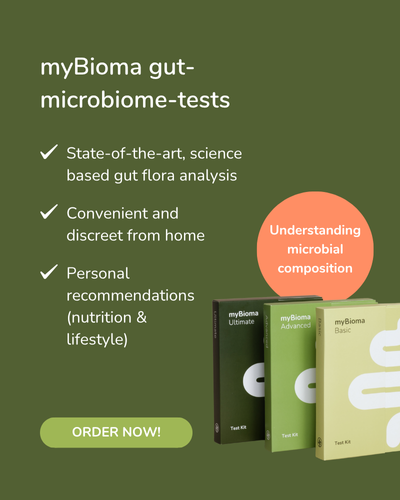Table of contents
- 1. What does fasting mean?
- 2. The Evolution of Fasting
- 3. Mysterious cell aging
- 4. The consequences of constant eating
- 5. How does fasting affect the gut microbiome?
- 6. Magic drug spermidine
- 7. Which foods contain spermidine?
- 8. It's all about the rhythm
- 9. Eat smart
- 10. A trick for feeling hungry: coffee
The time has come: the 40 days of Lent before Easter starts March 2nd . But is the originally religious fasting still an issue today? Yes, more than ever! Because fasting or Intermittent fasting is completely in trend . More and more studies are proving the incredible health benefits through the meal break. But what happens in the body and what is it like? Intestinal flora involved in it? And it works without giving up ? We clarify the many question marks in 10 points and show you Tips for easy implementation!
1. What does fasting mean?
Fasting has many definitions . On the one hand, religious fasting can be referred to in Christianity, Islam or Judaism, and on the other hand, fasting cures or Intermittent fasting . In the latter case, the day typically consists of one Eating window of eight hours and a fasting period of 12 – 16 hours . So that could mean breakfast at 7:00 a.m., lunch at 1:00 p.m. and dinner at 5:00 p.m. Another option is to have an absolute fasting day once a week , where you only drink water and tea. (1)
2. The Evolution of Fasting
The practice of fasting goes deeper than the traditions of various religions. In fact, its roots lie in the Stone Age and connect us with the animal world. Because our ancestors originally had to search for food strenuously and engage in intensive hunts to feed ourselves. The effort involved required a lot of time and energy, so subsequent breaks were necessary. Many animals in the wild still live this way today and have long fasting intervals between their foraging. Our bodies are designed for longer breaks from eating and even need them (2).
3. Mysterious cell aging
Long ignored by science, the benefits of fasting are only now coming to light. Avoiding food has particularly exciting effects on our cells. Harmful substances that arise during normal metabolism must be disposed of regularly. However , the relevant cleaning and recycling processes only take place in the cells when no new food is supplied. For “detoxification” Old energy reserves have to be reduced - this is the only way to properly clean the cell (2).
4. The consequences of constant eating
If pollutants are not sorted out regularly, our cells age faster and become susceptible to illness. Numerous studies have found that longer meal breaks increase the risk of Cancer, cardiovascular disease, diabetes and even obesity reduce significantly. But also people with rheumatoid arthritis (Inflammation of the joints) benefit from fasting as it can reduce the symptoms. You see, fasting is incredibly important for the body and helps you stay healthy and fit (2).
5. How does fasting affect the gut microbiome?
The exciting effects of abstinence go even further: fasting also influences the composition of your intestinal flora . Eating less frequently can cause some bacteria to multiply more than others. These bacteria produce certain substances such as acetic and lactic acid. Both substances are absorbed into the blood and stimulate fat breakdown . This means that when you fast, you not only lose weight by eating less, but your metabolism is boosted by the intestinal flora and excess fat is broken down (3). But what exactly are the changes that occur in the intestinal flora during fasting?
Scientifically proven effects of fasting on the gut microbiome
According to studies, fasting has the greatest effect on the ratio of Firmicutes to Bacteroidetes. The proportion of Firmicutes decreases, Bacteroidetes then form the majority of all bacteria in the intestine. This could have an influence on weight management, as Bacteroidetes are also known as slimming bacteria. Firmicutes, on the other hand, are able to extract more energy from the ingested food and therefore provide the body with more calories.
Another notable change is seen in the production of short-chain fatty acids (SCFA). Three months after a period of fasting, significantly higher levels of the fatty acid butyrate are found. SCFA are essential for a healthy intestine and intestinal mucosa and are important for reducing inflammation in the body. They can thus counteract or improve various intestinal diseases, such as irritable bowel syndrome, inflammatory bowel diseases or obesity by improving insulin sensitivity. (4),(5)
Fasting can therefore be very healthy for you, your gut and your gut health.
6. Magic drug spermidine
So fasting is healthy. But it’s not fun – there isn’t any Way past it ? Perhaps. A research team from Graz recently made an exciting discovery: a substance called spermidine can stimulate the cleaning and recycling of the cell in the same way! Fasting without fasting - almost, because the most effective thing is still the break from eating. Nevertheless , positive effects have already been achieved with the help of spermidine in animal experiments on multiple sclerosis and dementia (6). Incredible, isn't it?
7. Which foods contain spermidine?
Where do you get these from? Magic ingredient so? Have a particularly high spermidine content Wheat germ, legumes such as soybeans and Whole grain products . These foods are also good for your intestinal bacteria and can help build up a healthy intestinal flora. But also Mushrooms, mangoes and above all well matured cheddar cheese perform well. And what does it have to do with it? sperm on yourself? In fact, the namesake also has a high concentration, but its effect has not yet been tested (7).
8. It's all about the rhythm
Do you want to try fasting but don't know how to get through it ? No problem. Don't take on too much, just take it slowly. Your body and feeling of hunger have to get used to the change . For a week, try extending the interval between your last meal and breakfast to twelve hours . The next week try 13 hours and continue until you do 16 hours. Plus, you can have a cheat day or the weekend free!
Buchinger fasting (therapeutic fasting)
Buchinger therapeutic fasting is another fasting method that has attracted a great amount of scientific attention due to its many positive effects. Here, fasting is combined with other components from physiotherapy, exercise and sport, psychotherapy and other mind-body methods. Buchinger fasting is usually offered as a group experience in a therapeutic context under medical supervision and ideally lasts 2-4 weeks. Perhaps this would be something for you to try fasting together with others? The fasting period of the Buchinger fasting can be roughly divided into the following 3 food phases:
Phase 1: Pre-fasting (1 day before the fast)
- Vegetarian diet and a calorie restriction of 1,000 kcal/day
- Elimination of stimulants such as caffeine, alcohol or nicotine
Phase 2: Fasting
The total daily fluid intake should be at least 2.5 liters.
- 0.25 liters of freshly squeezed, organic vegetable or fruit juices
- 0.25 liters of vegetable broth
- Water and/or herbal teas
- a maximum of 2-3 teaspoons of honey
The supplements provide a limited supply of nutritional energy to counteract the breakdown of the body's own protein.
Phase 3: Breaking the fast and reintroducing food (usually 2-3 days after fasting)
After the fasting phase, some food is slowly reintroduced and the amount of calories to be consumed is increased by 200 kcal per day. On the first day of breaking the fast, 800 kcal are served, usually in the form of an apple and later a potato soup for dinner. The food is chewed slowly and carefully.
- Continue to increase your intake of liquids such as water and unsweetened herbal tea
The Buchinger fasting can lead to improved blood lipids and better blood sugar regulation, an increase in emotional and physical well-being and a very positive effect on the gut microbiome. Fasting has proven positive effects on functional gastrointestinal disorders (such as bloating, constipation, abdominal pain), irritable bowel syndrome, chronic constipation or inflammatory bowel diseases such as Crohn's disease and ulcerative colitis. (4), (8)
9. Eat smart
Of course , proper nutrition also plays a big role. Sweet sugar bombs first thing in the morning won't keep you full. Start the day with a balanced breakfast , such as our delicious millet muesli! Make sure to include whole grain products in your diet - this ensures long-lasting energy . You should also include enough proteins and healthy fats in your menu plan.
Long-term effects and aftercare after fasting
After a period of fasting, it is up to each individual to continue to pay attention to their diet. Studies show that the positive changes in the intestinal flora that result from fasting return to their original state within 3 months of the end of the fast. Fasting should therefore not be seen as a miracle cure to improve the composition of the intestinal flora, but rather as a supportive measure. (4), (8), (9)
After fasting, it is particularly important to give the bacteria in the gut the right food in order to maintain the short-term changes in the microbiome. Here are 3 tips to help you increase your gut diversity and thus reduce the risk of various diseases and obesity and promote your general well-being:
- Make sure your diet is high in fiber and nutrients. Prioritize whole grains, legumes, vegetables and fruit.
- Add variety to your diet. Try to incorporate as many different foods as possible. This can increase the variety in your gut and improve your well-being.
- Consume as many unprocessed foods as possible. This will reduce your intake of additives, preservatives and other additives that can harm your microbiome.
If you want to dive even deeper into the topic of gut-healthy nutrition, take a look at our recipe book "Microbiome Food", in which you will find over 40 delicious recipes.
10. A trick for feeling hungry: coffee
Now you need a little trick when hunger hits you. Buchinger fasting actively avoids it, but it is often used in intermittent fasting: black coffee . It makes every feeling of hunger disappear ! So if your stomach is growling in the morning, an espresso can solve the problem. And don't worry, four cups of coffee a day are definitely allowed (10). However, always pay attention to how you tolerate caffeine and decide for yourself whether fasting with or without coffee is the right way for you.
Modern research approaches / Outlook
Current and future research on fasting in relation to gut health and the microbiome is crucial. There is an urgent need for studies on the long-term effects of different fasting methods on specific disease patterns and gut flora. In addition, the role of nutrition after fasting is being intensively researched in order to maximize the long-term health benefits of fasting. The research contributes to gaining new insights and developing targeted approaches to improve health and well-being through fasting.
References
- (Peterson CM. Intermittent Fasting Induces Weight Loss, but the Effects on Cardiometabolic Health are Modulated by Energy Balance. Obesity (Silver Spring), 2019;27(1):11.
- Longo VD, Panda S. Fasting, Circadian Rhythms, and Time-Restricted Feeding in Healthy Lifespan. Cell Metab. 2016;23(6):1048-1059.
- Haas JT, Staels B. Fasting the Microbiota to Improve Metabolism?. Cell Metab. 2017;26(4):584-585.
- Mesnage, R. et al. (2019) 'Changes in human gut microbiota composition are linked to the energy metabolic switch during 10 d of Buchinger fasting', Journal of Nutritional Science, 8, p. e36. Available at: https://doi.org/10.1017/jns.2019.33.
- QuHu, X. et al. (2023) 'Intermittent fasting modulates the intestinal microbiota and improves obesity and host energy metabolism', npj Biofilms and Microbiomes, 9(1), p. 19. Available at: https://doi.org/10.1038/s41522-023-00386-4.
- Madeo F, Eisenberg T, Pietrocola F, Kroemer G. Spermidine in health and disease. Science, 2018;359(6374).
- Mohamed Atiya Ali, Eric Poortvliet, Roger Strömberg, Agneta Yngve: Polyamines in foods: development of a food database. In: Food & Nutrition Research. Volume 55, No. 1.
- Wilhelmi De Toledo, F. et al. (2013) ‘Fasting Therapy – an Expert Panel Update of the 2002 Consensus Guidelines’, Complementary Medicine Research, 20(6), pp. 434–443. Available at: https://doi.org/10.1159/000357602.
- Popa, AD et al. (2023) 'A Scoping Review of the Relationship between Intermittent Fasting and the Human Gut Microbiota: Current Knowledge and Future Directions', Nutrients, 15(9), p. 2095. Available at: https://doi.org/10.3390/nu15092095.
- EFSA (2015) Scientific Opinion on the Safety of Caffeine, EFSA Journal, 13(5):4102.









